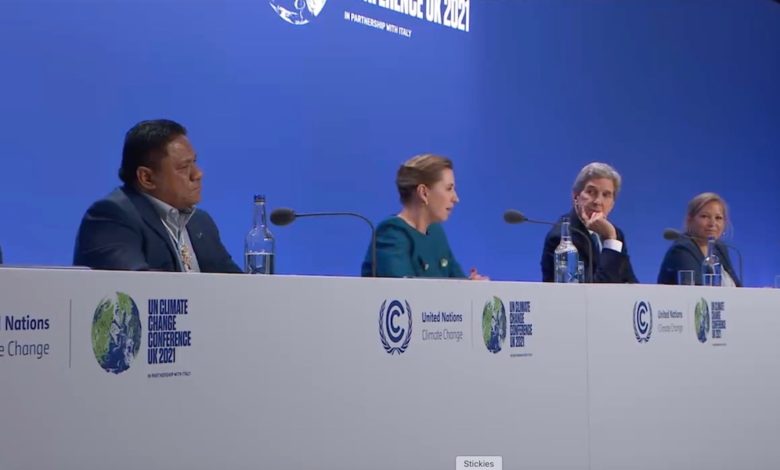Growing coalition of nations demand zero emissions targets for shipping

Denmark, the United States and 12 other countries on Monday at the COP26 climate summit in Glasgow backed a goal to reduce shipping emissions to zero by 2050, something that will come up for discussion later in the month at the International Maritime Organization’s Marine Environment Protection Committee gathering.
“We urge the IMO to take action to set ambitious targets to achieve zero emission shipping by 2050,” Danish prime minister Mette Frederiksen told reporters at COP26. “Carbon-neutral shipping is vital to reaching our climate goals.”
Belgium, Britain, Finland, France, Germany, Honduras, Hungary, Iceland, the Marshall Islands, Norway, Panama and Sweden also signed the shipping declaration, which commits countries to “work at IMO to adopt such a goal, to adopt goals for 2030 and 2040 that place the sector on a pathway to full decarbonisation by 2050, and to adopt the measures to help achieve these goals”.
The zero emissions target is a big jump from existing IMO targets which call for a minimum 50% cut in emissions compared to 2008 levels by 2050.
Speaking alongside the Danish prime minister, John Kerry, the US climate envoy, hinted that shipping ought to look more into nuclear propulsion.
While stressing that this was not an official American policy, Kerry related how as a former US Navy man, he was a fan of nuclear power, something that has worked without any casualties in the American military for more than 70 years.
The US has this month released a new detailed pathway report on how it intends to decarbonise the nation, which is on a per capita basis the world’s largest polluting country.
Regarding transport, the report states: “Making progress this decade requires investing in domestic manufacturing and reliable supply chains for clean fuels, batteries, and vehicles. In addition, research, development, demonstration, and deployment of electrification and zero- or low-carbon fuels for aviation and shipping will ensure we have the technology to continue reducing emissions across the entire transportation sector in the years leading to 2050.”

The golden pheasants are assembled in force but they are systematically strangling the world’s combined economies and condemning millions to lives of disease, darkness, hunger and poverty as a sacrifice on the altar of climate change. Shipping seems to have become a major target for their combined aggressive intentions. The full implications of what is being so piously proposed just beggars belief.